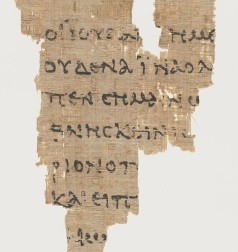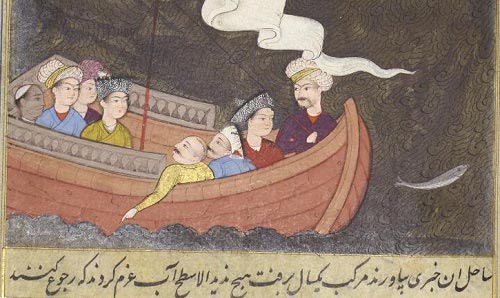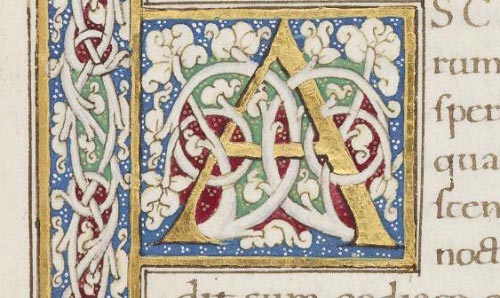
Religion and Theology Collections
Religion and theology have been a strength of the collections since the foundation of the John Rylands Library. All the world’s major religions are well represented in our collections.

Our printed, manuscript and archival holdings relating to Christian theology and ecclesiastical history are exceptionally strong, spanning the entire history of Christianity from antiquity through to contemporary evangelicalism, and documenting its many strands, including the Armenian, Syriac and Ethiopic churches, as well Roman Catholicism and Protestant Nonconformity.
Christian materials at the Rylands span nearly two millennia, from the oldest known fragment of the New Testament to modern records of the Methodist Church in Britain. They cover the globe, including Syriac material from the Middle East, Ethiopian manuscripts and Persianite paintings of the Holy Family. From papyri fragments to medieval manuscripts to print, the Christian collections cover a range of denominations both before and after the European Reformation, including missionary materials. The Christian holdings sit alongside rich collections of Jewish theology and Islamic manuscripts, as well as holdings relating to Buddhism, Zoroastrianism, Hinduism, Sikhi, and the Dongba and Bon religions of China and Tibet.
Bible collection
Early English bibles were the first rare books that Enriqueta Rylands collected systematically, from January 1891, forming the core of the internationally significant Rylands Bible Collection that includes more than 400 different languages and dialects.
Amongst these are a rare collection of manuscripts associated with John Wycliffe, the two-volume Gutenberg Bible printed at Mainz in c.1455, the 36-line Bible printed at Bamberg in 1458-60 and six of the twelve editions of William Tyndale’s biblical translations printed in his lifetime. The collection also holds the four great Polyglots of the 16th and 17th centuries and six editions of the Erasmian New Testament.
In addition to nearly 100 printed editions of the pre-1500 Latin Vulgate and a number of important manuscripts, the Collection includes first editions in virtually every language with strength in missionary printings particularly from the British and Foreign Bible Society.
Early Christianity
Papyri in Greek and Egyptian include the earliest known fragments of the New Testament (the St John’s Gospel fragment, or Greek P457) and Greek Old Testament and a substantial number of other important canonical and non-canonical texts.
Notable examples of the written culture of Christian communities in the Middle East are found in a number of our manuscript collections, particularly Coptic, Syriac (including Karshuni), Arabic, and Armenian.
Medieval European Christianity
The Library holds a wealth of medieval manuscripts from major scriptoria across Europe, including illuminated works of scripture, books of hours, missals, artistic texts and apocalyptic literature.
The records for religious institutions form another part of the collection, including medieval charters relating to Pluscarden Priory, Morayshire, and part of the archives of the Canonesses of the Holy Sepulchre, who took over the House of the Frères Coquins in Liège, Belgium. In addition, the medieval Beaumont Charters relate to abbeys in Normandy.
Reformation
The role of the Protestant Reformation and subsequent Christian denominations are well represented, particularly the printed pamphlets associated with Martin Luther, Desiderius Erasmus and Philipp Melanchthon.
English politico-theological upheavals of the 17th century are reflected in the English Tract Collection, the Street Literature Collection of ballads and broadsides, and the Sutherland Collection of late 17th- and early 18th-century tracts.
Protestant Nonconformity
Nonconformist Christian denominations are well represented in the Rylands Collections, reflecting the religious commitment of John and Enriqueta Rylands as Congregationalists. The Thomas Raffles Collection of autograph letters, documents and engraved portraits encompasses many important figures across a range of denominations. The John Rylands Hymn Collection demonstrates the Rylands family’s ecumenical approach to Protestant worship.
The Methodist Archives and Records Centre is the national collection of the Methodist Church in Britain, containing manuscripts, printed items and archives stretching from Wesley letters to recent periodical publications. It is widely regarded as one of the finest research resources in the world for the study of evangelical religion in its broad social, political and economic context.
The role of Nonconformist education is also a key feature of the collections, which include printed material and archives of Unitarian, Baptist, Methodist, Moravian and Congregational Colleges. The Midgley Reference Library and Wilmslow Quaker Collection contain materials of interest to the Quaker movement, while other local congregations are represented in the impressive Anglican parish libraries of Nantwich and Poulton-le-Fylde and the Clogher Diocesan Library.
Christian Brethren Archive
The Library contains the world’s largest archive relating to the Christian Brethren, an evangelical Christian movement formed in the nineteenth century. This includes 18,000 books and periodicals from the 19th century to the present, and archival materials including administrative materials, correspondence and unique material relating to the foundation and early days of the movement. Missionary activity and evangelism are particular strengths of the Christian Brethren Archive.
Theology and church history
In addition to the foundation collections, which represent Biblical theology as it stood at the end of the 19th century, there is earlier theological material in the G. L. Brook Theology Collection and in the library of James Prince Lee, Bishop of Manchester.
The Library also holds the archive of the pioneering Faculty of Theology at the University of Manchester, and the papers of James Maurice Wilson (on liberal theology), Arthur Samuel Peake (biblical scholar), John Graham (on Quaker theology and ethics), and Thomas Manson (biblical scholar). Church history and ecumenism are also represented in the papers of Jack Keiser (lay ministry), Thomas Raffles (church historian), dom sylvester houédard (ecumenical movement), and Edward Freeman (church historian), as well as the archives of the Industrial Mission Association and the Women in Theology Group.
Judaism
The Rylands’ rich collections of Jewish material are fully explored in the Jewish Studies Collections guide which introduces one of the world’s most valuable and diverse collections of Hebrew and Jewish manuscripts, archives and printed books.
Particularly significant for the study of early Jewish scriptural texts are the ‘Deuteronomy fragments’ from the second century BCE, and tiny fragments of the Dead Sea Scrolls recently found to contain text. Theological texts and religious practices are also evidenced in Samaritan and Hebrew manuscripts, early printed Bibles, amulets and manuscripts in the Gaster Collection, and the Genizah Collection of eleven thousand fragments from the Ben Ezra Synagogue in Old Cairo (Fustat), Egypt.
Religious customs, practices and learning from the early modern period onwards are explored in a range of collections from rabbinic scholars.
Islam
The Islamic faith is well represented in manuscripts from the Middle East, North African and South Asia.
Papyri and manuscripts from the Middle East contain Qu’ranic manuscripts from the 8th century CE onwards with many commentaries, other theological texts, and some documentary sources. There are theological and religious texts included in the Rylands’ Persian and Turkish manuscripts (including Ottoman Turkish and Çağatay), such as a 15th-century multi-volume Qu'rān in Arabic with Persian and Çağatay translations.
Islamic theology, practice and history are present in the substantial collection of Arabic manuscripts, including a number in Maghribi Arabic script from the Maghreb, and in a small collection of Pashto (Afghan) manuscripts.
Buddhism
Pali Manuscripts from Southeast Asia include a range of Buddhist materials. These manuscripts were written on palm leaf, paper and lacquer and date from the 17th to 19th centuries. A number are highly ornamental, notably Pali MS 82 which comprises seven large bundles containing the Tripitaka, with carefully incised letters and covers inlaid with elaborate designs in mother-of-pearl. There are also Buddhist texts in Sanskrit, Thai, Burmese, Tibetan, Nepalese, and Bengali.
In addition, the collection of Benedictine monk and expert on Christian-Buddhist relations dom sylvester houédard (1924-1992) contains a range of printed works on Buddhism.
Zoroastrianism
The Library holds a small but important collection of Zoroastrian manuscripts comprising copies of the Avesta, religious treatises, collections of poetry and fables, a vocabulary, and works on history and astrology. The texts are in a variety of languages including Avesta, Middle Persian, Farsi, and Gujarati.
The large Persian Manuscripts collection also contains Zoroastrian texts. The manuscripts were copied in Iran and India from the 14th to the 19th centuries and encompass a variety of scripts including Pahlavi, Nagari/Gujarati, Arabic and Pazend.
Hinduism
Hindu texts can be found across the Indic language manuscripts, especially in the Sanskrit and Hindustani collections. These include richly illuminated manuscripts of sacred texts, perhaps produced for pilgrims or European collectors.
Sikhi
One of the most significant single items in the collection is a 17th-century manuscript (pothi) of the Sri Guru Granth Sahib, the principal sacred scripture of Sikhi. As the living embodiment of the Guru, the Guru Granth Sahib is deeply revered by the Sikhs. There are two further manuscripts at the Rylands which contain Sikh scripture.
Dongba and Bon
The Library contains the second largest collection of Mo-So manuscripts in Europe, relating to the Dongba religion of the Na-khi or Mo-So people of South-West China. The collection consists largely of notebooks created for the performance of secret ritual ceremonies, some of which are decorated. A small number contain Chinese and Tibetan translations.
Dongba derived from the Bon religion of Tibet, for which a rare set of ritual texts survives in the Tibetan Manuscript collection.
List of collections
Physical collections
- Arabic Manuscripts
- Armenian Manuscripts
- Beaumont Charters
- Bible Collection
- Dr Bray Clerical Lending Library
- George L. Brook Theology Collection
- Canonesses of the Holy Sepulchre Archive
- Chinese Collection
- Clogher Diocesan Library Collection
- Congregational College Archives
- Congregational College Printed Collection
- Copinger-Hartland Manuscripts Collection
- Coptic Manuscripts
- English Tract Collection
- Edward Freeman Papers
- Edward Freeman Printed Collection
- John Graham Papers
- Greek Manuscripts
- dom sylvester houédard Book Collection
- dom sylvester houédard Papers
- Industrial Mission Association Archive
- Jack Keiser Papers
- Latin Manuscripts
- Thomas Manson Papers
- Midgley Reference Library
- Moravian Church Manuscripts
- Mo-So (Na-khi) Manuscripts
- Nantwich Parochial Library
- Northern Baptist College Archive
- Northern Baptist College Printed Collection
- Pali Manuscripts
- Parsi Manuscripts
- Arthur Samuel Peake Papers
- Persian Manuscripts
- Pluscarden Charters
- Protestant Reformation Printed Works
- Thomas Raffles Collection
- Hymn Collection of John Rylands
- South-East Asian Manuscripts
- Street Literature Collection
- Sutherland Collection
- Syriac Manuscripts
- Tibetan Manuscripts
- Turkish Manuscripts
Digital collections
- Bible Illustrations in Manchester Digital Collections
- Gaster Amulets in Manchester Digital Collections
- Hebrew Manuscripts in Manchester Digital Collections
- Latin Manuscripts in Manchester Digital Collections
- Magic, Monsters and Macabre in Manchester Digital Collections
- Persian Manuscripts in Manchester Digital Collections
- Syriac Manuscripts in Manchester Digital Collections
Further information
Related subject pages
- Africa Collections
- Ahmed Iqbal Ullah RACE Centre Collections
- Christian Brethren Archive
- Classics and Ancient History Collections
- East Asia Collections
- Family, Estate and Charter Collections
- Jewish Studies Collections
- Methodist Collections
- Middle East Collections
- South Asia Collections
- Southeast Asia and Australasia Collections
- University of Manchester Archives and Academics' Papers
- Visual Collections
- Western (European) Manuscript Collections

Exploring subject areas
An overview of our Special Collections, including information about the background and history of our holdings.

Special Collections A-Z
Explore the Special Collections through the collection names and descriptions using our searchable A-Z tool.
